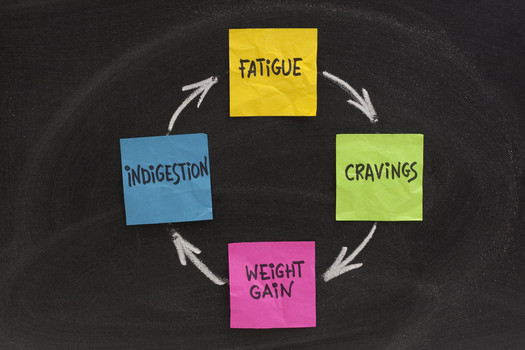Yes! Like many disorders, Chronic Fatigue Syndrome can cause weight gain. However, unlike many disorders treating cause of the weight gain is not as simple as a changing ones diet.
Chronic Fatigue Syndrome or CFS is a complex disorder that affects the body physically and mentally. The main characteristic of CFS is extreme fatigue that does not get better with bed rest, and usually gets worse with mental or physical activity. Unfortunately, Chronic Fatigue Syndrome has no known exact cause, making it difficult to treat. Diagnosing CFS can be just as difficult due to the multiple symptoms that may mimic other syndromes or diseases. These symptoms range can include:
- Weakness,
- Muscle Pain,
- Impaired Memory And/Or Mental Concentration,
- Insomnia, And,
- Weight Gain
With the complex nature of this disorder, a diagnosis can take years for an individual to receive. Per the CDC (Center for Disease Control) in order to receive a diagnosis of chronic fatigue syndrome, the patient must meet three criteria. First the patient must experience severe chronic fatigue for 6 months consecutively. Second, the patient must show that the fatigue interferes with their daily activities, and, third, the patient must also have at least 4 of the following symptoms:
- Post-Exertion Malaise lasting More Than 24 Hours
- Unrefreshing Sleep
- Significant Impairment of Short-Term Memory or Concentration
- Muscle Pain
- Pain In the Joints without Swelling or Redness
- Headaches Of a New Type, Pattern, Or Severity
- Tender Lymph Nodes in the Neck or Armpit
- A Sore Throat That Is Frequent Or Recurring
Obviously, with the numerous symptoms, Chronic Fatigue Syndrome can be hard to manage and treat for many patients. In addition, if it were not bad enough, Weight gain is a particularly frustrating and very common side effect of CFS. Studies have shown that individual’s with CFS and/or Fibromyalgia on average gain 32 pounds. This is due to the nature of Chronic Fatigue Syndrome. Individuals with CFS do not have the normal metabolically response to stress. For a patient with CFS, when the mind or body experience stress they have a hard time turning their body/mind off for a break. Therefore, when most bodies are taking a break, for a CFS individual the body goes into severe over-time, and cannot turn off normally. This is what causes stress on the body, which then in turn causes severe fatigue. Fatigue causes a metabolic chain reaction, and the body goes into survival mode; stressed out and searching for energy. The bodies thyroid system levels are responsive to this stress and can cause deficient thyroid hormone levels, which lead directly to weight gain. Eating is the body’s normal reaction to low energy. Unfortunately, for people with CFS, the body is constantly feeling the need for more energy, thus prompting the individual to eat.
Luckily, many times when an individual is treated for low thyroid hormone levels the body can recover and will stop or slow the weight gain. We all know eating right, and working out are two very important activities to maintain a healthy weight. However, due to the severe fatigue an individual with CFS experiences, finding the energy to work out mentally or physically is extremely difficult and may exacerbate the fatigue, which leads to stress related weight gain. It can be tricky to lose weight if you have CFS, but it is not impossible. If you have Chronic Fatigue Syndrome and are experiencing weight gain here are a few tips they may help you lose or maintain your weight while keeping into consideration low energy levels.
- When you are feeling energetic, prepare meals ahead of time. This will help you from grabbing just anything to eat when you are too fatigued to cook.
- Have on hand healthy snacks. Buy a pre-made veggie and cheese tray at your local deli or produce department. This take the guesswork out of preparing a healthy snack and it will last all week if stored properly.
- Take daily walks. No one expects you to go run a marathon. However, multiple short, walks throughout the day will help you burn more calories without over stressing your body.
- Sleep. Although most patients feel severs fatigue with CFS, many have a hard time getting restful sleep. Therefore, make your sleep a priority:
- Nice cool temperature, between 62° and 64°
- Try reading in bed for a ½ hour instead of watching T.V.
- Develop sleep pattern by going to bed and waking up at the same time each day
- Write in a journal anything that is causing stress in your life. Many therapists have said this one daily activity will help take the stress out of one’s mind and put it on paper, before sleep.








